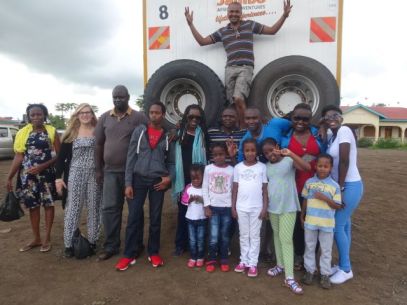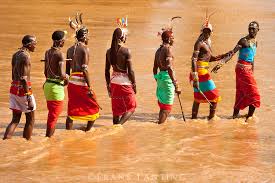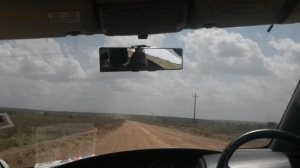Ah, Leviticus. No one’s favorite book. Whoever hijacked Moses’ tongue in Exodus is in his element in Leviticus. In Exodus we got a taste of law and order. Here, we have law and order edition 2: blood sacrifice; how to diagnose leprosy; hundreds of reasons why you are all unclean and deserve death and; a sexual code of conduct that makes a heroic attempt at listing all possible perversions that would have been possible at the time.
Exodus set the scene for the priestly takeover. God stops communicating with people personally, instead choosing to perch on Mount Sinai and later, in his tabernacle. He also becomes so holy that people are not allowed to be in his presence or to see him. The only exception, of course, are the priests, who were selected from Aaron’s family line. So now in Leviticus, we have the Priests consolidating their power, and putting the fear of a distant, angry, all seeing, all knowing God into the Israelites.
- God has very specific taste when it comes to sacrifice: The Israelites are told that God accepts male, unblemished animals, birds (for those too poor to offer animals), fine flour with oil, and the first fruits of the land. It is very important that the flour not contain leaven and that all the offering must be seasoned with salt. Flour has to be burnt with fine oil and Frankincense. He also likes the fat from the animals as well as kidneys and the liver. He does not accept entrails, which are known to you and me as matumbo. (Whatever is cooking sounds kind of tasty, actually). I lost count of the number of reasons they had to make sacrifices but I feel like it was for everything – sin, thanksgiving, illness, cleansing, and celebrations of God.
- Priests get a pretty good deal: They are allowed to keep the ‘first fruits of harvest’ and any remainders from flour offerings. Priests can also eat sin offerings and guilt offerings because whatever they touch becomes holy. They also get every breast and thigh of animals given as peace offering. Israelites are also not allowed to eat fat or use the blood of animals and if they do so, they will be cut off from the people. (So eating mutura gets you forced into exile).
- Ignorance is no defense: God makes it clear that the Israelites can commit offenses that they don’t know about. When that happens, they have to sacrifice a young bull. If an individual commits a sin unknowingly, he has to sacrifice a ram. For commoners, the price is a female goat. (This is a running theme in Leviticus – poverty does not excuse you from paying for your sins, and much like the tax code, every economic class is subject to a different fine/ fee.)
- A lot of things can make you unclean: this includes touching the carcass of an unclean animal,touching an unclean person and having an emission of semen (wash in the river and unclean for the rest of the day). I would love to know how this law was enforced- how would the priest know that a man was unclean because he came? Wouldn’t this mean that at any particular time of day, at least half of the male population would be considered unclean?
- Sexual conduct: Chapter 18 lists all the people that you are not allowed to see naked, including your parents, siblings, and your extended family as well as a reminder that seeing a woman naked during her period is not allowed. (I’m thinking uncovering nakedness might have another meaning here…) Then at the very end we have the all famous ‘You shall not lie with a male as with a woman; it is an abomination.’ Chapter 20 also reminds us to put to death any man who commits adultery with his neighbor’s wife, and not spare her either, as well as an extra reminder not to ‘see the nakedness’ of a sister from a mother or father. Priests are expressly forbidden from marrying prostitutes, and if ever a priest’s daughter is found guilty of harlotry, she must be burnt to death.
- Aaron’s sons make a massive boo-boo: Not much goes on in the way of direct intervention from God, except for this time that Nadab and Abihu, Aaron’s sons, who took his censer, lit it and laid incense on it. (This means they didn’t follow proper sacrifice protocol). God’s judgement was brutal and instant. He sent fire down from heaven and incinerated them. And then Moses forbade their families from mourning for them. Later Aaron has to make a sacrifice, including releasing a goat into the wild to atone for their sins.
- An Israelite woman’s son is stoned to death: Our second brief interlude from the law comes when this boy, who’s father is Egyptian, it is emphasized, gets into a fight and blasphemes God’s name. So they take him to Moses, who consults with God, who then says that witnesses to this event should put their hand on the boy’s head and they should stone him to death. This is where the proclamation ‘When a man causes a disfigurement in his neighbor,as he has done it shall be done to him, fracture for fracture, eye for eye, tooth for tooth… ‘ is made.
- All things kosher: This is pretty well known. You can eat animals that have hoofs and chew cud. Birds are okay, except vultures, ravens, ospreys, kites, falcons, ostriches, vultures, pelicans, storks, herons and a couple of other gross birds. Insects are okay as long as they don’t have four feet. No swarming things allowed, like geckos, crocodiles, mice, weasels and chameleons. Actually if they even touch your clothes then your clothes are unclean too.
- About the womens: When you have a baby boy, you are unclean for 7 days, then you get him circumcised and then you are unclean for another 33 days. If you have a girl, you are unclean for 2 weeks, and then another 66 days. Your period makes you unclean for 7 days, and anything or anyone that touches you is also unclean, including your bed, your chair, and any man foolish enough to ‘lie’ with you. (So for every year, your average woman is untouchable for almost 3 months for the sin of bleeding from her gross lady parts and she literally can’t sit with you)
- Public health: Chapter 13 dedicates 59 excruciating verses on the management of leprosy in all its describable forms. Priests, of course are responsible for diagnosis, treatment and ritual cleansing of these lepers, which also extends to their clothing and property. For example, once quarantine away from the people is over and the person shows no sign of disease, this is what he must do next – ‘ the priest shall command them to take for him who is to be cleansed two living clean birds and cedar wood and scarlet stuff and hyssop; and the priest shall command them to kill one of the birds in an earthen vessel over running water. He shall take the living bird with the cedarwood and the scarlet stuff and the hyssop, and dip them and the living bird in the blood of the bird that was killed over the running water; and he shall sprinkle it seven times upon him who is to be cleansed of leprosy; then he shall pronounce him clean, and shall let the living bird go to the field. ‘ This process must be repeated to cleanse his house as well. And he also has to give a guilt offering to God for being diseased.
- Other forbidden things: No witchcraft or consultation with mediums is allowed. Fathers cannot force their daughters into prostitution, and parents are forbiden from sacrificing their children to Molech. Men are not allowed to round off the hair on their temples or mar the edges of their beards. Israelites are also warned against cursing the deaf or putting stumbling blocks before the blind. When it comes to business, you cannot keep a man’s wages overnight, you cannot tamper with scales and you cannot interbreed your cattle. God also commands that the Israelites treat strangers well, and to not gossip about their neighbors.
- Blemished men cannot approach the alter: this includes anyone who is blind, lame, has missing or mutilated limbs, hunchbacked, has eye problems, is a dwarf, or has crushed testicles (huh??)
- Disobey at your own peril: The punishment for not following God’s laws is explained several times, but this is the most graphic – You shall eat the flesh of your sons, and you shall eat the flesh of your daughters. And I will destroy your high places, and cut down your incense alters….and I will lay your cities to waste, and I will make your sanctuaries desolate…and I will devastate the land, so that your enemies that settle in it shall be astonished. And I will scatter you among the nations, and I will unsheathe the sword after you; and your land shall be a desolation, and your cities shall be a waste. (Can you imagine a Pastor shouting that at his congregation every Sunday? This is the stuff of nightmares. )
Leviticus is ground zero for atheists trying to prove a point about how nasty the Christian God is, expose Christian hypocrisy on the selectiveness of the application of God’s laws as laid out in the bible (why don’t we stone adulterers anymore/ allow for the wearing of clothing with mixed fiber/ not burn our children for harlotry, etc, if we insist on quoting the Bible as reason to condemn homosexuality?) It’s a rich and easy target because a lot of the laws are ridiculous, impossible to follow, excessively cruel and often seem to have no real purpose that somebody living in the 21st century can decipher.
Then we have the Christians, who feel as though they have licence to dictate society’s moral code, and will go to great lengths to justify the use passages from Leviticus to prove their point. Thus we have a nice little deadlock with each side shouting the same thing over and over again to infinity and beyond.
But when it comes to letting the church dictate society’s morals (and then using the bible to justify it), my gut feeling is that the church is forced to evolve along with the rest of society, albeit extremely reluctantly. So eventually, one day in the distant future, I think that the church will eventually abandon condemning homosexuals in the same way it abandoned justifying slavery, and eventually decided that God doesn’t actually condone slavery and that everyone, including the so called sons of Ham (also known as black people) should be free.
Leviticus also paints a picture of a bleak, miserable world with many harsh rules, many of them punishable by death. It paints a society where being a woman is downright horrible, a large amount of time is dedicated to appeasing an angry and vicious God through sacrifice for atonement for multiple sins and death is always around the corner – either as a direct punishment for breaking the law, or as collective punishment for the transgressions of your people. I suppose this is why Christians have a tendency to blame the world’s problems on the decadence and sinfulness of modern society as a whole.
The words written in the bible have always been as clear as day and night. But our interpretation evolves as our circumstances change. Again and again and again. And as long as we become more accepting, inclusive and forgiving, that’s actually something to be proud of.



























